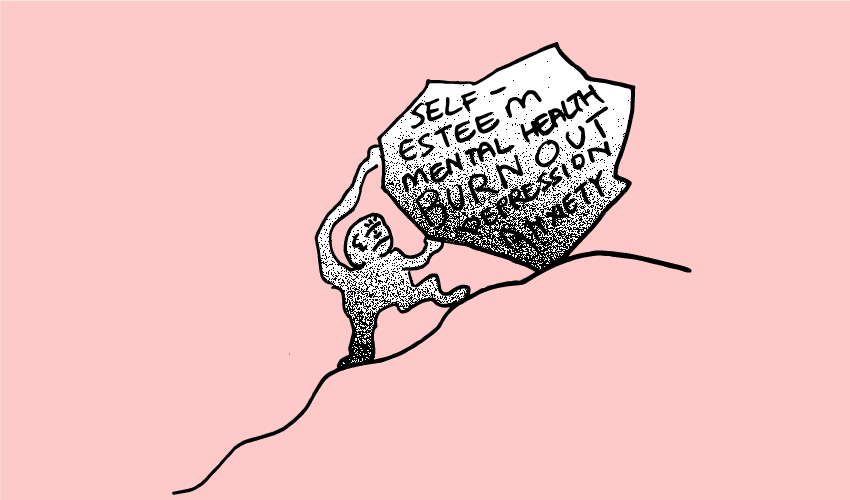Where Are You From? The Paradox of the Model Minority
By Omid Kazemi
Art by Nico
“Luckily you’re not Arab” one Grindr date said to me post-hook-up, following my response to his question, “Where are you from?” In fact, I have received this comment in more or less encrypted forms all my life. “Ah, Iranians are well-educated people” is an often-iterated phrase, along with common adjectives as “cultured”, “beautiful” and “modern”. These are uttered usually prior to an altered facial expression suggesting relief for not being part of another ethnic group of which they originally suspected me. Many Iranians, or self-described “Persians”, revel in this reputation. Far from acknowledging the sinister prejudice that lies beneath, there is imbued in us a drive to uphold this perception of our culture.
In reality, I was born in the UK and raised in Canada. I often tell people I am from Iran because I know the question, “Where are you from?” is rarely a genuine inquiry into national identity, unless you are white (of course). Growing up, I felt the pressure of being a model minority. It is presumed that we do well in school, study lucrative careers and make money. It is uncommon to question these presumptions, even within the exemplified minority group. Even less common is recognizing how destructive they are.
One study on discrimination against Turkish minorities in Germany and the Netherlands found that job applicants of Turkish origin were on average eleven percentage points less likely to receive a positive call back from prospective employers. Moreover, this study reported that additional information in the CV and cover letter did not reduce discrimination against Turkish job candidates. Another study of the Department of Economics at the University of Konstanz shows that a German-sounding name increases the average probability of a call back by around 14 percent. They also noted that discrimination was reduced when they restricted their study to applications containing favourable reference letters regarding the candidates’ personalities, implying disbelief in a minority candidate’s competency in the absence of explicitly positive feedback.
The findings of these and similar studies are common in diverse countries. Minorities are often at a disadvantage in the labour market. There might be the impression, however, that the model minority is not burdened by these disadvantages, since those in power hold them in higher regard. In fact, the perceived favourability of some minorities over others serves to reinforce negative stereotypes about the less-celebrated visible minorities. In the personal anecdote above, my Iranian identity was used to insinuate that Arabs are somehow inferior to Iranians. This ranking of minorities can in turn be weaponised to argue against distributing social benefits to certain communities, invigorating a cycle of ethnic suppression and socioeconomic imbalance, and giving an added appearance of validating prejudices. However, though this is one of the misfortunes surrounding the myth of the model minority, there are negative consequences for those inside the minority as well.

For starters, it can hinder natural creativity. The imperative for success is a crucial trait of the model minority, since the reason for being a model is the perception of prosperity among its individuals. The need to succeed creates an environment hostile towards entering the arts, as there are few vocations as marred by the possibility of failure and poverty, and encourages occupations with a certainty of success and economic security, such as medicine or law. These are fine professions, if one is naturally inclined to them. However, more often than not the creative talents of individuals are pre-emptively discouraged for fear of damaging reputations. Of course this is not exclusive to model minorities, but it is a defining characteristic of them largely due to the demands of keeping up the appearance of being “one of the good ones”.
Another way in which the construct of the model minority can impede the pursuit of happiness is through the expectation to excel at work, despite having opportunities often withheld from us. The phenomenon of employers tending to hire people with customary names from within the majority culture also puts the model minority at a disadvantage. As such, even model minorities receive less job opportunities per application and hold fewer higher-level positions in the workforce. Yet we are nonetheless expected to flourish. As a consequence, it can feel like living in a paradox.
The paradox of the model minority is the need and expectation to succeed in order to retain positive exemplification even though success is kept significantly out of reach. This creates an almost Sisyphean reality, increasing the likelihood of self- esteem and well-documented mental health issues, such as burn out, loss of motivation, depression and anxiety, further compounding the pressures of life. Being a model minority is thus through the paradoxical state to which it gives rise more pernicious than it at first appears.
Hopefully, the rising awareness of systematic disadvantages will precipitate a change towards allocating opportunities based on individual merit and need rather than generalizing from misguided prejudices and ultimately end the myth of the model minority to everyone’s benefit. Before then visible minorities can do their best to stick together and realize that imposing constructs which elevate some over others ultimately undermines us all.
Get DADDY in your Inbox
Stay in the loop by subscribing to our newsletter